How often do I think about the Roman Empire? Not often enough
The crisis of cinema, the case for more sad and sexy gladiators, Netflix stars, decline and fall of a prince and my true Roman Empire: Hugh Grant.
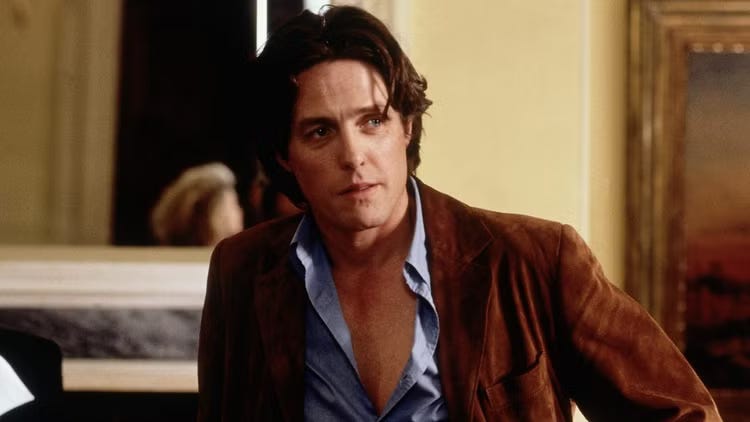
A Week in the Life is where I share snippets into what my life in London is like over the course of a week. Expect thoughts on books, films, technology, cultural differences, creative industries and reflections on everything under the sun. Or grey skies, this is London after all. Let’s keep it real.
Monday 11th November
If you asked me what business anyone has on Liverpool Street at 6:30 pm on Monday in the heart of winter the answer is none whatsoever.
But this is where I find myself as I’m attending an event at a law firm to speak to a contact about a compay we’ve been emailing about. As this person is in London for a few days only all the way from Canada we had agreed to meet at this event to catch up.
At the event, I make a beeline to my contact to tackle at once the reason why I’ve crossed London in the dark so I can leave as quickly as possible. However, this backfires as she introduces me to the person she was speaking with as I arrived, another woman, and leaves the two of us to chat as she excuses herselt and goes to greet someone else.
This will be repeated a few times during the evening, resulting in a silly chasing game that leaves me with a string of introductions to people I will never see again after today but with whom I must exchange LinkedIn details after what seems a polite amount of time speaking about our respective areas of work because it’d be rude not to.
Two hours later, afraid I may have to connect to yet one more person on LinkedIn and still not having managed to speak with my contact properly, I head for the lift defeated. Time: 9 pm. Will to live: minus 10. Not bad for a Monday.
On my way to Liverpool Street station I walk past Dirty Dicks, a pub whose name reflects what any given night out in this city usually comes down to. What a lost opportunity not to have hosted the event here, I say to myself as its bright lights catch me giggling like an idiot.
Tuesday 12th November
Not sure how I’ve arrived here, but I’ve spent the last hour in the comments section of an advice property column in the newspaper discussing the rising cost of ground rent.
Something that, thanks to the generous contributions of readers, I learn is only an issue for people living in England and Wales, whose land ownership schemes are remnants of a feudal system that is hard to eradicate.
Given my investment in this area of knowledge one could think that I’m on the brink of building my real estate empire and therefore I’m gathering intelligence to be well equipped for tough negotiations when in reality I struggle with the notion of “enough is enough” and can’t even afford to rent a flat on my own in the outskirts of Shitholeshire, let alone the luxury to entertain the idea of worrying about whether a property offers a share of freehold.
It’s soon obvious to me that people in the comments are mostly Baby Boomers who have been able to buy multiple properties and learn from their mistakes over the years. I doubt many millennials can substantially contribute to this conversation in the current housing crisis. However, regardless of dominant demographic, this is a great place to access expert information in a quick and simple way.
If one leaves aside political commentary, which is very divisive in any country, British people are highly participative and usually well-informed on most subject matters. Heading for the comment section is therefore a great free resource to get detailed explanations, often with examples, on a wide range of complex questions, such as whether your girlfriend should stop using your toothbrush or your husband should teach your dog how to bite so it can enter a competition.
Just when I’m about to close the webpage and considered my thirst for land ownership knowledge sated, I come across a comment that finally states the reason why so many people find a share of freehold -which I’ve learned is a better solution than a leasehold and a good compromise failing to secure a freehold- a complete and utter pain in the ass.
It’s the neighbours. Of course.
How could I have forgotten already about the engrained reluctance of British people to engage in anything resembling human interaction with a neighbour.
On a different note, I seem to be reliving the hormonal madness of adolescence and its intense pulsions, all triggered by having watched Hugh Grant in Heretic recently.
The only cure is to indulge in a healthy dose of Bridget Jones to scratch the Hugh Grant itch. A woman, at least this woman, can’t never have too much of caddish Hugh Grant, who’s admitted Daniel Cleaver was closer to the real him at the time than the romantic leads he had played until then.
Would there be a time when I don’t raise my eyebrows knowingly, say “Mmm, hello!” in the creepiest of voices and salivate like Pavlov’s dog when Respect starts playing and the lift doors open to reveal Grant’s face? Unlikely.
Glad that he’ll be reprising this role for Bridget Jones’ Mad About the Boy. Can’t wait to see what Daniel Cleaver has been up to all these years.
Wednesday 13th November
In East London today for a conference I’ve been invited to and organised by a law firm, different from the one who organised the event I attended on Monday.
According to the invitation I received this event is about “emerging technologies and the power of ideas,” and I will be joining “creatives, innovators, entrepreneurs and policy-makers to harness the opportunities and tap on the skills needed for the future.”
Sounds just like the other two conferences I attended last week and for a moment I feel like an experiencing an event-vu.
Luckily there are a few surprises in store at this one.
The first one is that I bump into someone from Creative UK that I’ve been trying to speak with in person for over a month. “So nice to finally see you in person!,” he says with a smile and he means it because his pupils dilate slightly. Something video calls can’t quite capture.
The second surprise is that Sam McAllister is doing a keynote after the afternoon coffee break. The countless hours I’ve spent watching Netflix pay off as I can info-dump on a colleague about who McAllister is and why she must watch both Scoop and the infamous Prince Andrew interview on Newsnight. At my tenth “No, seriously, you really have to watch it!,” she just looks me in the eye and says “Ok, I’ll watch it,” which comes out more as a cry for mercy than true enthusiasm for the source material.
McAllister is engaging, very funny and a terrific storyteller who captures’ everyone’s attention the moment she starts talking. After her keynote she stays on for a fireside chat hosted by a lawyer from the firm that has organised the event.
She sends the whole room into an audible gasp when she mentions that in all the months that the conversations to secure this interview went back and forth not even once was a lawyer present as part of the PR team of Prince Andrew. In fact, not even once did anyone at Newsnight spoke to a lawyer advising Prince Andrew because there was none to begin with.
According to McAllister, “he probably never thought this could actually have any consequences for him,” and therefore didn’t see the need to get legal counsel even though his relationship with Jeffrey Epstein and the rape allegations that appeared on the press at the time would be clearly brought up in any interview he agreed to.
A picture of a smiling Prince Andrew posing next to Emily Maitlis is then shown on screen. “He really believed it had gone well,” the tone of disbelief still audible in McAllister’s words as she points to the image, which she took with her personal phone after the interview had finished to capture history in the making as she witnessed the decline and fall of a prince, obvious to anyone but him.
Obliviousness is indeed the greatest of gifts for those in power.
After a day of talks, we’re invited to join a drinks reception at the basement. It’s already 6 pm so I’m not planning on staying long as I have a work lunch tomorrow and my social battery has been in deficit since I left the house on Monday for that other networking event. However, I want to speak to a person I know from this law firm to thank them for today’s invitation as I’ve seen them around, so I join the queue for the lift to go downstairs.
The space for the drinks is what can be described as artsy. It’s all high ceilings, dark marbles and open-space layout with an interactive wall that displays what seem modern art works in bright colours that contrast with the low lights that change from hues of purple to reddish every few minutes and then go totally dark for a few seconds, creating a bit of confusion.
I presume whoever designed this is an up-and-coming interior designer who sold it as cool and modern space for informal gatherings. The reality, however, is that it is impossible to know who the hell I’m talking to, or if they still there. That’s when I’m not startled by the suddent materialisation of a body two inches away from me, whose owner is equally startled because they too can’t see shit. It may be a wild guess, but I’m willing to bet the so-called designer of this gigantic dark room has a soft spot for Dirty Dicks. The pub, obviously.
In this state of semi-darkness I’m slowly moving around the room, arms slightly outstretched to avoid bumping into people or things. I make out a waiter slowly approaching from my left as if he were floating on air. He carries a tray with elongated glasses that he presents to me like a votive offering with the slightest of forward movements.
“Prosecco?,” I ask.
“Champagne,” he answers.
Three glasses later, I decide it’s time to get out of this blackhole.
As I head to Old Street station I receive a message from a colleague about the lunch we have tomorrow with one of our business partners. “I hope they actually don’t want to talk about work,” it reads. “Well, it wouldn’t be totally out of place if they did,” I respond in a state of blissful giddiness and complete exhaustion.
Like Prince Andrew, I too have understimated the consequences of my excesses.
Thursday 14th November
Lunch goes exceptionally well mostly because we don’t talk much about work, or not more than strictly necessary. Instead, we use the opportunity to do something that seems to be at risk of extinction nowadays: getting to know each other in person.
That’s how I learn that the director of this business partner company we work with has a Master’s in Microbiology. “What happened there?,” I ask as no one does a postgraduate degree so specific -likely requiring an equally specific undergraduate degree- to then wind up in real estate. “I got tired of spending my days inside a lab and wanted to do something a bit more dynamic,” he replies.
This opens the door to a very engaging conversation on education and how we are faced with making choices about our future at an age when we have no idea of who we are or want to do because we lack any practical experience of the real world and its possibilities.
We debate how there is so much pressure to get a degree and most importantly whether people actually need one for some jobs when higher education is turning into a privilege that leaves many with huge debts (in the UK university fees are set to rise again next year) at a time where AI is rapidly transforming the job market and creating mounting uncertainty about the future of work.
It turns out that none of us has a degree related to what we are doing for a living and in fact, one representative of the partner company didn’t go to university. “I started working quite soon in hospitality and managing restaurants, and the skills I needed for this role weren’t so much different,” he admits.
That’s one of the things I admire the most about the UK. Back home the idea of transferable skills, or the thought that you may want to change careers at some point in your life, is completely unthinkable.
On my way back home I pop into Foyles, my regular pit stop every Thursday, and browse a copy of Whose body? by Dorothy L. Sayers.
After reading the first few pages I have an epiphany: The world needs Hugh Grant to play Lord Peter Wimsey sooner rather than later in a new limited series or film adaptation. He would totally nail this part and have a blast being the archetypical British gentleman who also happens to be an amateur detective with wit and charm to sell.
Try to read the below in Grant’s voice if you’re not convinced and you’ll see what I mean:
“The deuce you have - what an energetic devil you are! I say, Parker, I think this co-operative scheme is an uncommonly good one. It’s much easier to work on someone else’s job than one’s own - gives one that delightful feelin’ of interferin’ and bossin’ about, combined with the glorious sensation that another fellow is takin’ all one’s work off one’s hands. You scracht my back and I’ll scratch yours, what? Did you find anything?”
And now that you too have seen the light, I know what you’re going to say next: Cristina, but Wimsey is a young bachelor in the novels. Yes, but he must have had a life too, so Grant could play a mature version of the character. I’m not asking that much. If I did, Hugh Grant should be cast in every movie ever made until he drops dead and still I wouldn’t be satisfied.
Substack people, work your magic and make it happen. I bet someone knows someone who knows someone who can put this idea in motion. You’ll thank me later.
Friday 15th November
The day is off to a great start as I’ve secured a ticket to see A Streetcar Named Desire in February with Paul Mescal, who is reprising his Olivier-award winning role for a limited 3-week run.
He’s one of the most talented young actors right now, with a great knack for sad and sexy characters (not my words, Amelia Dimoldenberg’s in her Chicken Shop episode with him). If you haven’t seen him in All of Us Strangers (opposite an extraordinary Andrew Scott, another fantastic Irish actor) or Aftersun, these are two wonderful films where he gives stellar and, be warned, very heartbreaking performances.
Luckily, he’s also starring in the less tear-jearking Gladiator II so later on today I’ll be looking at him clad in a short skirt because no one said one couldn’t also be sad and sexy in Ancient Rome.
I confess that when the news broke about an upcoming sequel I didn’t see the need to reboot a movie that had already been made.
It felt a bit lazy as an idea, more in line with the current trend of capitalising on existing intellectual property (IP) à la Marvel that has a pre-existing fanbase and therefore it is likely to be a commercial success than with the spirit of creating something from scratch that hasn’t been done before -or not like that- and could give people what they didn’t know they wanted.
That’s the magic of cinema, and by extension of any art: it exposes you to something you hadn’t imagined it could exist but which is everything that speaks to your heart.
Cue Hugh Grant as Phoenix Buchanan in Paddington 2, a perfect example of how you can use a well-loved character (it goes both for Hugh and Paddington) in a franchise and yet bring something fresh to it with every new instalment so it doesn’t become predictable and can still attract new audiences.
However, over the past few years I’ve read nothing but how the film industry is in crisis despite films like Oppenheimer and Barbie -both original films, no remakes, no CGI fuelled- attracted enormous audiences.
The Barbenheimer phenomenon got people excited again about the shared experience of watching movies together at the cinema and showed that there was a market for these kind of stories too. Mind you, one was an uplifting account of an hecatomb and the other lasted almost three hours and people loved both.
An experience that was replicated with Dune Part II, another lengthy film, when it came out in March this year. And while it’s true that there was a loyal fanbase who grew up loving the novel, there wasn’t a global fandom ready to follow Paul Atreides to Arrakis and beyond.
Dune Part II achieved the impossible as I went from not knowing anything about the story -I’m not a massice sci-fiction fan- and ignoring Dune when it came out in 2021 to watching it at the cinema at a special screening before the realese of Dune II (seen five times, twice on IMAX) and also reading Dune and Messiah by Frank Herbert, all in the span of two months. Contrary to what people may have you believe, there are advantages to possessing an obsessive-compulsive personality.
Both books however proved rather less exciting than the Denis Villeneuve’s adaptations and if it hadn’t been for watching Dune before reading the first book, I doubt I would have got into this universe.
If anything this is further proof of how someone’s extraordinary vision has translated Herbet’s dry prose and sparse descriptions into an story of epic scale and vivid cinematography, capturing the attention of new audiences unfamiliar with this cautionary tale on the the dangers of charismatic leaders.
The ongoing cinema crisis has many causes and the conversation is sometimes dominated by the interests of big studios, who have realised churning out franchise after franchise will no longer cut it. Meanwhile, independent studios with original ideas often lack the means to finance and distribute movies that may not have massive appeal but which tell important stories.
With cost of living stretching the budget for leisure activities at one end of the stick and the closing of cinema venues and the impact of the pandemic at the other - despite the proven social benefits of cinemas for local communities-, not to mention the rise of streaming platforms, it’s been a tough few years for cinema and cinema lovers.
However, one of the main problems in recent years has been the lack of original ideas told in a way that people feel compelled to watch on the big screen and experience in the company of others. Over the past year and half, where I’ve watched over 100 new releases at the cinema, it became obvious when a story clicked with the audience and got its undivided attention. Something shifts in the air and it’s magical to be part of it.
Sometimes this reaction is sparked by a well-known classic, like When Harry Met Sally, which I went to see at the Prince Charles Cinema recently to a full, laughing house, a testament to the writing of Nora Ephron; some other times it’s the story you least expect -Monkey Man by Dev Patel or Thelma with June Squibb were quite the revelation this year- as independent production companies have irrupted in the market over the last decade bringing an array of new narratives and perspectives on the screen.
Of these, A24 is perhaps the most representative as in few years it’s managed to produce Oscar-worthy films such as Everything, Everywhere, All at Once (highly recommended) and become synonymous with original stories with highly cinematic quality that people want to experience together at the cinema.
In fact, when I went to watch Heretic for the second time last last Sunday afternoon, an A24 production, the room was packed. This was ten days after the movie had been released, which is a very positive sing given that mostindependent films are often given a very limited run at cinemas -when they do have a theatrical launch- to prove their worth to audiences and unless they have enough financial muscle for production and distribution they are likely to go largely unnoticed even when they have important and entertaining stories to tell.
That’s perhaps why the news that Hugh Grant was starring in an independent horror film surprised many, but it actually makes sense as over the past decade he’s been favouring roles where he can experiment with his craft and embody darker characters. His solid acting chops will attract people to whatever he is in so it’s a win win when you think about it. This too is what audiences want to see - actors playing against type and having fun being the opposite of what we expect of them. Given Grant's highly acclaimed character work of late and the reputation of A24, Heretic needed little else to intrigue the public.
If we add that Hugh Grant is phenomenal in this role and has received accolades left, right, and centre generating even a much deserved Oscar buzz for his performance of Mr. Reed, an enigmatic man obsessed with religion that is visited by two Mormon missionaries, it’s not difficult to see why audiences have been drawn to cinemas to watch a wordy psychological thriller where nothing much seems to happen until it does.
In the interest of transparency there’s another reason why a take on religious horror, another highly unlikely genre for me to watch, is hitting a sweet spot for me.
If I knocked at the door of a stranger’s house and Hugh Grant happened to be living there and wanted to retain me for no reason using every trick and excuse he could come up with, I wouldn’t be suspicious he might have second intentions.
I would be very much hoping he did.
Right about bloody time after having nurtured a crush on him for nearly 20 years.
Grant is not only a handsome devil but also an actor that understands the underlying principle of movies. As he has stated on more than one occasion the purpose of a film, above all things, is to entertain. Which according to the dictionary means to provide someone with amusement or enjoyment.
An entertained audience is an engaged audience, one that wants to go to the cinema to partake in the shared joy, fear, sadness, or hilarity that a film provokes in it.
Isn’t that what Maximus Decimus Meridius asked the crowd all those years ago after all?
Let’s see if Paul Mescal rises to the challenge and brings the house down a quarter of a century later as a sad and sexy gladiator fighting for his life, and the audience’s favour, against the backdrop of the Colosseum.
Saturday 16th November
At the Duke of York’s Theatre of see Barcelona, a play written by Bess Wohl and directed by Lynette Linton, which is also the West End debut for Netflix superstars Lily Collins (Emily in Paris) and Álvaro Morte (Money Heist).
This is an iteration on the question of IP, this time through the building of a personal brand. Collins and Morte have become globally famous thanks to a platform that has distributed their shows to audiences that traditional tv channels couldn’t have had access to and that level of exposition has resulted in both being associated with content that boasts millions of fans across the world.
Which in turn has translated into an opportunity for them to try something new, like a stage debut at the heart of London’s theatre land, because their personal brand is strong enough to draw in the crowds. Even when the crows are seasoned theatregoers in a city that has built its reputation on its unmatched cultural offering, including a very strong theatre scene.
I was skeptical about how Morte and Collins would come across on stage -was this a vanity project, would they be any good at all?- and which kind of play this would be, but 20 minutes into it, we are all having a great time and there has been a constant string of laughter since the beginning.
Lily Collins is funny, witty, vocal, a bit emotional, confused, confusing and also extremely endearing as Denver native Irene, who is on a night out in Barcelona and ends up at the house of a tall, dark and extremely attractive stranger. Everyone who’s watched Emily in Paris is probably thinking how much more interesting the series would be if Emily behaved like this three-dimensional character and not like a bowl of boiled potatoes, waiting to be smashed and sprinkled with a bucket of salt in order to be slightly interesting.
Álvaro Morte is Manuel, who despite external appearances as a dreamy and taciturn Spanish macho Alfa hides a big secret whose revelation will be the catalyst for both protagonists to take action in their lives and start fully inhabiting them.
In the 90 minutes that we spend in the company of Irene and Manuel we’ve laughed and felt a pang of pain for their suffering and what has caused it. I’m pleased I came to see this play drawn by the personal brand of its actors. It’s the closest to a romantic comedy I’ve seen on stage in London and it has a few interesting dark turns that add depth to the characters.
Next step is for Álvaro Morte to be cast in “Emily in whatever city she goes next” because he and Lily Collins have great chemistry. I’m sure Emily would benefit from a dalliance with a macho Alfa made in Spain.
Back to the crowded streets of central London where it’s impossible to walk two steps without bumping into three different people coming in as many directions towards you. I don’t understand what compels a person of sound mind to position themselves, of all places in the world one can choose to be, in Central London on a weekend. It is social suicide at its finest.
As I try to escape the crowds I crash into a group of tourists who have decided to stop dead in the middle of the street to look at their phones for directions. And in that instant it’s when something hits me with the force of a wrecking ball.
Is it really happening or am I imagining it?
I stay very still and focus on listening. This time the noise comes louder and is getting closer.
There is no doubt: it is finally here. At long last.
As the deafening notes of All I Want for Christmas is You from a tuktuk cycling past me mute every other sound, I let out a sight of relief and even forgive the tourists I’m still cursing.
I was wondering when I would be hearing this song for the first time this year and was beginning to worry about why it was taking Mariah so long to hard-launch Christmas season officially.
Luckily half of London’s tuktuks have agreed to play this Christmas anthem today. The other half have stuck to Last Christmas.
Sunday 17th November
I’ve been withholding my verdict on Gladiator II as I needed to reflect on it for a bit in order to avoid harsh judgement. I also needed to rewatch Gladiator -which I did yesterday night- and then go back to what I made of Gladiator II. It’s a thorough process, you see.
After careful consideration, I admit it’s a good movie. There’s no doubt lots of work and money have gone into producing it and it shows. The script and storyline could have been better as at points it lacks a bit of rhythm and grit, and some characters like Lucilla (Connie Nielsen) and Acacius (Pedro Pascal) could have been developed further and given more screen time as the conspiracy subplot had legs, but it’s a solid 3.75 out of 5. And more importantly, the audience seems to be entertained judging by the box office performance.
I wouldn’t dare compare it to the original Gladiator because there is no need, and yet it’s a movie that does it justice and would make Hugh Grant happy as it’s highly entertaining. Not sure it’ll go down in history as a classic, but it’s definitely the kind of film that whenever you catch it on tv, you’ll want to watch again.
Although I realise that with streaming services on the rise this kind of serendipitous encounter as one changes tv channels distractely will probably become as extinct as Ancient Rome itself since television has probably its days counted. In the end it’s true that what we do in life echoes in eternity.
Let me rephrase that then: Gladiator II is the kind of movie that whenever it happens to be available on your streaming platform of choice for a limited time, you’ll want to watch again.
Or, in my case, you may want to head to the cinema not even 48h after watching it for the first time to experience it all over again but on a much bigger screen and with many more people, all reacting as one, like a well-commanded Pretorian guard, to the intrigue, the blood on the arena and the doubt of whether we’re watching Jumanji as this second instalment features apes, rhinos and sharks.
But I’ll tell you this much: this is a movie that makes you want to go to the cinema and experience it in the company of an audience, if only to watch Denzel Washington eat that screen like a juicy grape and adjust his toga to get ready for the Award nominations that will be surely raining on him.
Most importantly Gladiator II has proved that Paul Mescal can be the Alpha Male this kind of film demands to be credible, maybe opening the door to new roles in the future. Could Lucius be his Daniel Cleaver and mark a turning point leading him to combine his trademark work in independent films with bigger productions?
If Crowe’s Maximus was rebellious, Mescal’s Lucius is brooding, quietly observing those around him, a silent but commanding figure. After all, Lucius has lived in exile most of his life, removed from the intrigues of the Empire and unaware of his blood ties with Maximus, whom for all we know he hardly knew. It would have been unrealistic to expect him to be a copycat of a condecorated general whose character was forged in lenghty military campaigns.
This is a good example of how you can keep audiences entertained by exploring the road less travelled by casting against type and choosing an actor whose work to date has mostly seen him depicting vulnerability and contained emotions, not brute force, to give a spin to the franchise.
It’s quite telling that Ridley Scott decided Mescal was the man after watching him on Normal People, a role that couldn’t be more different to the one he plays in Gladiator II, but which probably gave Scott ideas about how he could bring back this story for a new generation.
Mescal pulls off a convincing sad, sexy, and idealistic gladiator who looks great not only in his beloved short shorts but also in short skirts and makes me want him in ways that would set feminism all the way back to Ancient Rome. I now understand why that question about how often people think about the Roman Empire went viral last year. And of course Paul Mescal was asked about it.
By the way Ridley Scott is already working on Gladiator III, which will take the action out of the arena and into politics, and Paul Mescal is up for it.
Hopefully we won’t have to wait long for a third, and possibly last, instalment of the saga that has put the Roman Empire back in everyone’s mind.
I’m sure there’s a role for Hugh Grant in there, he’d make a fantastic Roman tyrant and I don’t recall seeing him in a toga yet.
Besides, when Hugh is no longer around to indulge my wildest fantasies and entertain us with his interesting role choices, I need to be reassured there’s a charming Irishman ready to take his baton and give us solid performances in any possible role he chooses to play. The more against type, the better.
Abroad is an independent publication about identity and belonging, living in between cultures and languages, the love of books, music, films, creativity, life in London, and being human in the age of artificial intelligence.
Thank you for reading Abroad!
If you’ve been entertained, like, comment and share as much as you like as so other can discover this publication as well. And if you find yourself here regularly, consider subscribing to receive updates and support my writing.





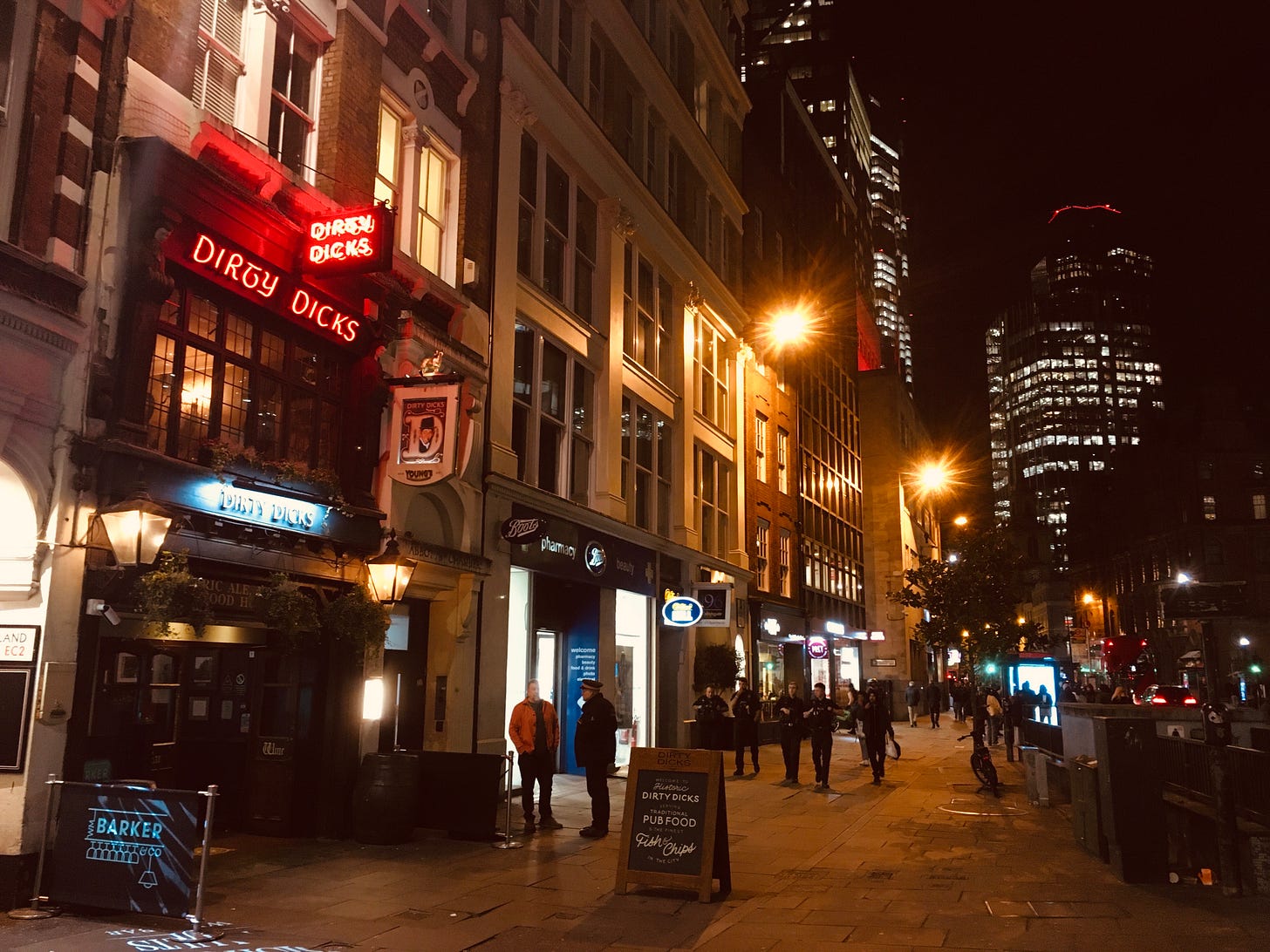


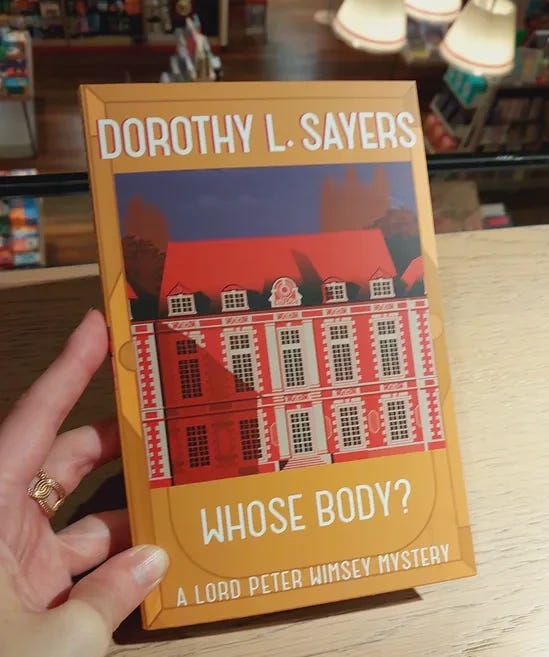
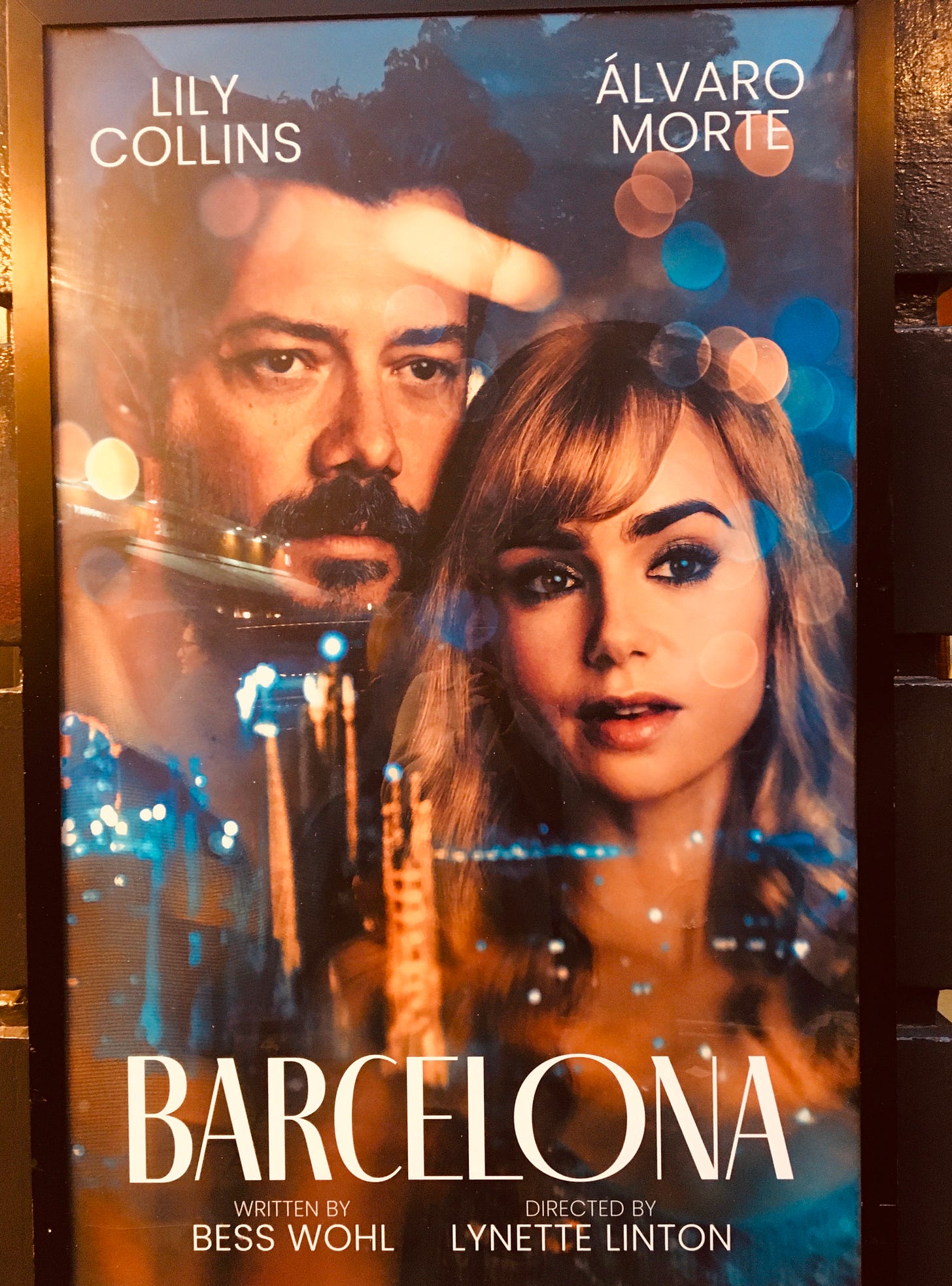
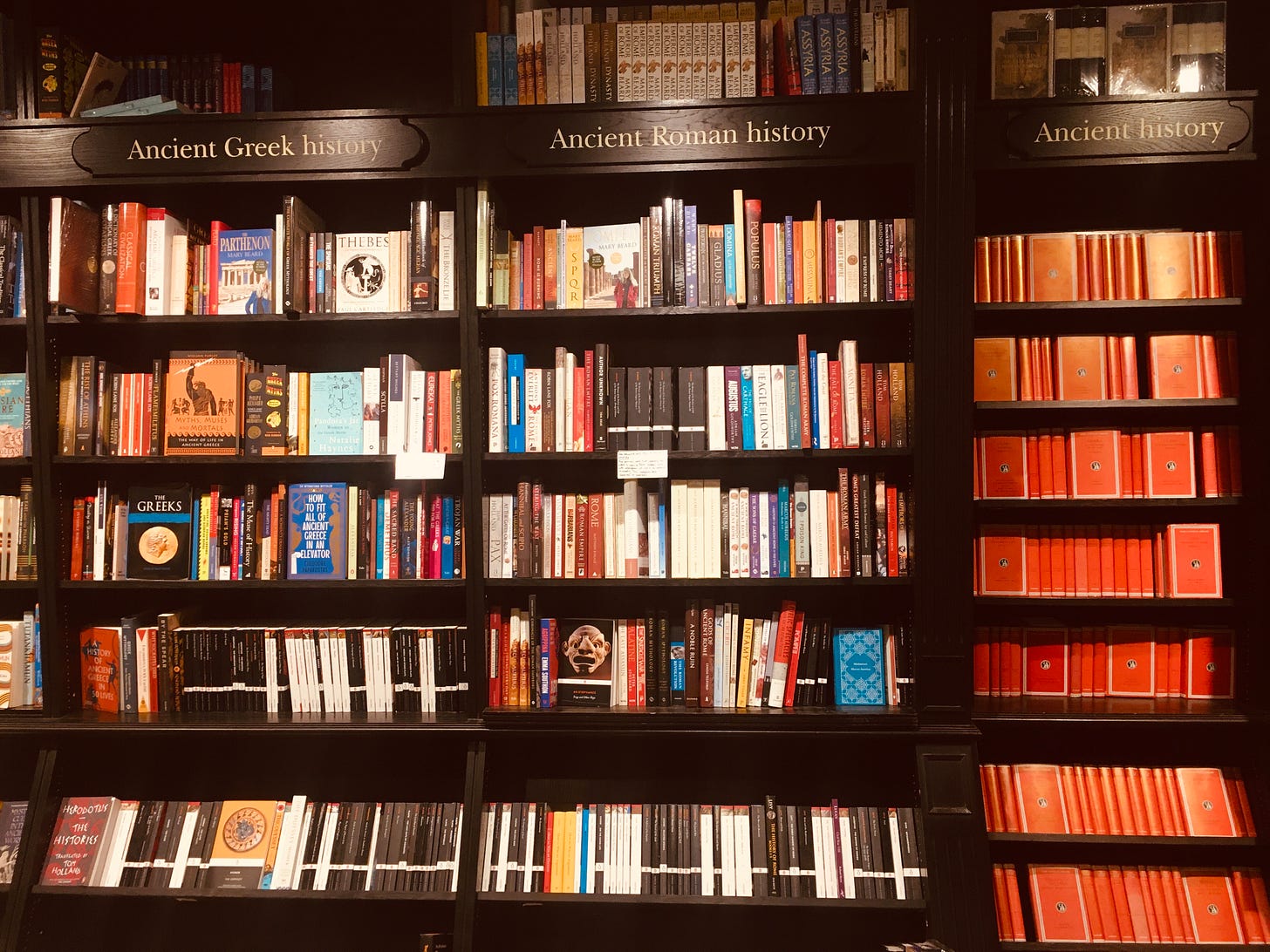


So much in there, appreciated it all.
How was it different to watch Gladiator 2 and second time ?
And hello fellow Dune 2 obsessive — I thought I was the only one who felt it was so engaging to merit 5+ viewings in the cinema (I think I did 9). I didn’t find much of interest in the first time and hadn’t read the book (now have), but there is so much to love now that both films are out. In the end I think it was the sound design that I went back to the cinema for in the last few times.
Oh the joys of networking at events, either you’re stuck talking to someone who will never be useful or you’re forever chasing someone down who keeps getting away. But then sometimes you bump into someone so amazing it’s all worth it in the end